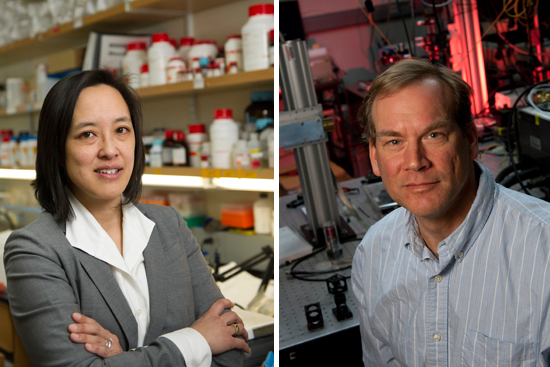New BU Initiative to Boost STEM Education
Goldberg, Wong named to coordinate teaching, recruitment

As part of the BU’s STEM Education Initiatives, ENG’s Joyce Y. Wong (left) will direct a new University effort to recruit and advance women in STEM fields. Bennett Goldberg, a CAS and an ENG professor, has long been involved in STEM education. He was recently appointed director of BU’s STEM Education Initiatives. Photos by Kalman Zabarsky
It’s a fitting acronym: STEM is the basis for budding careers, for the growing of cutting-edge research, and for increased competence across a range of disciplines. While Boston University has long shown a strong commitment to education in STEM fields—science, technology, engineering, and mathematics—it has recently launched an initiative to improve that commitment by boosting interdisciplinary cooperation, recruiting more students in underrepresented populations, and arming the University with even more of a competitive edge in seeking outside funding.
Jean Morrison, University provost and chief academic officer, recently named two BU faculty members to take STEM to the next level. Bennett Goldberg, a College of Arts & Sciences professor of physics and a College of Engineering professor of electrical and computer engineering, has been appointed director of BU’s STEM Education Initiatives. Joyce Y. Wong, an ENG professor of biomedical engineering and of materials science and engineering, has been named director of a new University effort to advance women in STEM fields.
Goldberg will be responsible for oversight and coordination of efforts to “increase effectiveness of instruction” in STEM subjects, says Morrison in announcing the appointment. “A world-class scientist, innovator, and teacher, who has devoted his career to impactful interdisciplinary scholarship, Professor Goldberg is exceptionally equipped for this responsibility,” she says. The new post includes four major areas of oversight: leading an effort to “articulate the aspirations” of BU faculty for undergraduate STEM education; working with schools and colleges and the Center for Excellence and Innovation in Teaching to advance the “sharing of best practices”; working to boost recruitment of students, including women and minorities, underrepresented in STEM programs; and directing the development, writing, and submission of grants supporting STEM education at the University.
“STEM education at BU has a fair amount of innovation, but we don’t have a really coordinated effort or strategic plan,” says Goldberg. “If you look at what’s happening in higher education in the United States, there are a lot of pressures, and our model for the future must include high-engagement learning—moving away from the traditional talking head at the front of the class.” In STEM education in particular, the talking head model reaches “a very small fraction of our students,” he says.
STEM education at BU is already embracing this move away from the traditional lecture model, but Goldberg will coordinate the establishment of more interactive learning studios, more peer learning, more small seminars like those used in some engineering courses, and more roundtable teaching. “My job is really to figure out what kind of support is necessary and how we can create a collective vision,” he says. “It’s planning, it’s discussing, it’s developing, and it’s implementing.”
Goldberg, who was named BU’s 2013 United Methodist Scholar-Teacher of the Year, has long held an active interest in improving education in math and the sciences. Director of the Center for Nanoscience and Nanobiotechnology since 2004, he earned a bachelor’s from Harvard University and a master’s and a doctorate from Brown University. Of Goldberg’s work cultivating clean energy sources, developing new drug delivery systems, and diagnostic methods, Morrison says that he “has committed himself to breaking boundaries, working across fields of scientific research in a way that pushes the limits of our capabilities.”
Wong is “uniquely positioned to help BU emerge as a leader in addressing the underrepresentation of women” in STEM fields, according to Morrison. She notes that while BU attracts outstanding female students and faculty in these fields, “there is more work to be done both in recruitment and retention and in our endeavors to support their success.” Wong’s undergraduate and doctoral degrees are from the Massachusetts Institute of Technology. Her research focuses on the development of biological materials that could aid in detecting cancer and cardiovascular disease.
“I look forward to engaging all members of the BU community and to reaching out to the many people on campus who are running excellent programs at all levels, precollege, undergraduate, graduate, postdoctoral, and faculty, to advance STEM in an equitable manner,” says Wong.
Comments & Discussion
Boston University moderates comments to facilitate an informed, substantive, civil conversation. Abusive, profane, self-promotional, misleading, incoherent or off-topic comments will be rejected. Moderators are staffed during regular business hours (EST) and can only accept comments written in English. Statistics or facts must include a citation or a link to the citation.